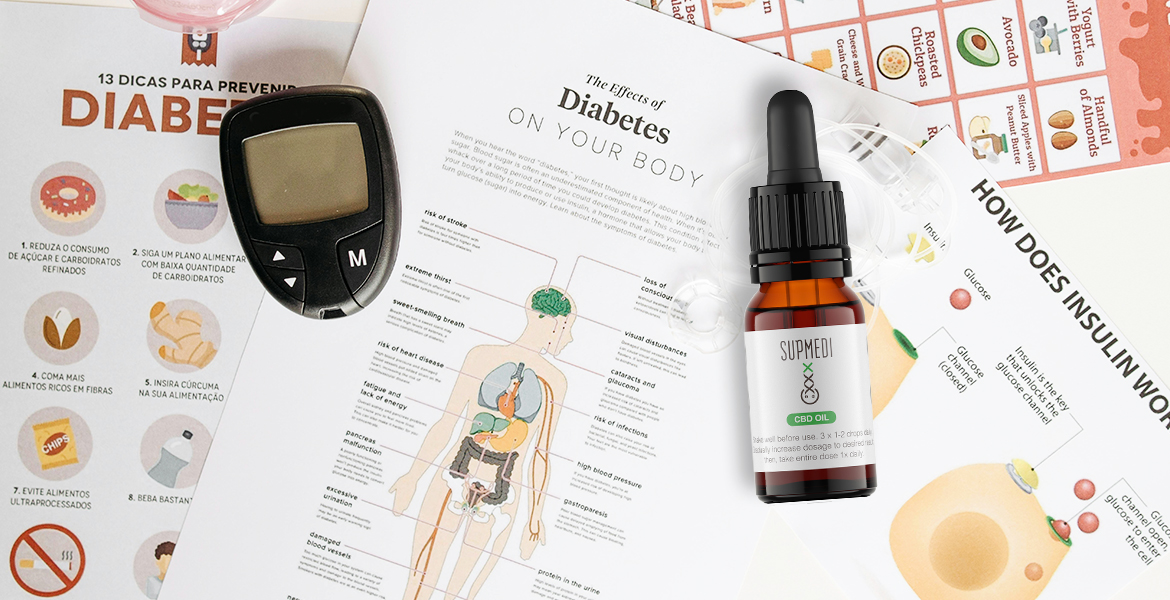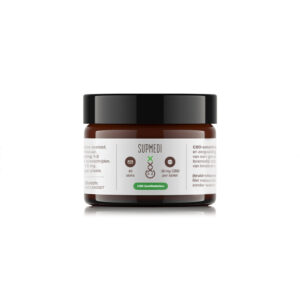
How Can CBD Help with Type 1 Diabetes?
15 August 2024Many people with chronic conditions try CBD to alleviate symptoms, but can it also help with Type 1 diabetes? CBD influences both physical and mental well-being. There is growing evidence that it may be beneficial for various symptoms associated with Type 1 diabetes. In this blog, we explore the possibilities.
The properties of CBD
What makes CBD Oil so special, and why can it be used for various ailments? CBD interacts with our body’s own system, particularly the endocannabinoid system (ECS). This system is responsible for maintaining homeostasis, or the natural balance in our body. The body naturally uses endocannabinoids to send messages to cells through receptors. These are cannabinoids that the body produces itself. But CBD (cannabidiol) is also a cannabinoid that can interact with the ECS and cell receptors.
It has become clear that the ECS is involved in a wide range of processes, including pain processing, appetite, mood, sleep, metabolism, stress, and immune function. Endocannabinoids may be the most versatile signaling molecules out there. This is why CBD can be so versatile in its use and may also help with Type 1 diabetes.
CBD has anti-inflammatory, pain-relieving, and calming properties. Given that diabetes is fundamentally an inflammatory disease, often accompanied by pain and exacerbated by stress, CBD has great potential as a natural treatment method for diabetes.

How CBD can be used in Type 1 diabetes
Type 1 diabetes is an autoimmune disease. In this condition, the immune system attacks the cells in the pancreas that produce insulin. Insulin is a very important substance because it regulates your blood sugar levels. While CBD may be useful in managing Type 1 diabetes, it cannot make your body produce insulin again. However, it can help alleviate other symptoms.
Anti-inflammatory properties
One of the key properties of CBD is its ability to combat inflammation and oxidative stress. Cannabinoids affect nerve endings, where they reduce pain and inflammation. The advantage is that these substances work directly where the problem is, unlike conventional painkillers, which also only offer temporary relief. This is important because diabetes is an inflammatory disease. Moreover, unchecked inflammation can contribute to insulin resistance. Therefore, reducing inflammation is a crucial factor in relieving diabetes symptoms.
Protection of beta cells
In Type 1 diabetes, T lymphocytes (a type of immune cell) attack the beta cells that produce insulin, causing the pancreas to stop producing insulin. This hormone is needed to keep blood sugar levels in balance.
CBD may help protect these cells in Type 1 diabetes. Specifically, the atypical cannabinoid Abn-CBD. Research shows that this cannabinoid can help improve the inflammatory status in autoimmune diseases in preclinical models. It led to a reduction in pro-inflammatory cytokines, combated cell inflammation, and reduced attacks by autoimmune cells.
The research was conducted on mice, so it is not yet certain that the same results can be achieved in humans. However, Abn-CBD is seen as a potential new treatment to be used in the early stages of Type 1 diabetes.

Pain relief
One of the common complaints of Type 1 diabetes is neuropathic pain. This severe pain occurs because the nerves, especially in the feet and legs, are damaged by high blood sugar levels. CBD can help reduce pain and swelling in neuropathy. These pain-relieving properties can bring significant relief and greatly improve the quality of life.
Stress, anxiety, and other complaints
Being chronically ill due to Type 1 diabetes can also lead to psychological complaints. Managing the disease can be stressful, and living with pain and discomfort is a heavy burden. Here, too, CBD can be a useful tool. It has a calming effect and can help both physically and mentally to relax. This reduces anxiety and helps you unwind more easily.
This benefits you not only during the day but especially at night. Stress and restlessness can keep you from sleeping, while a good night’s sleep is essential for recovery. The calming properties of CBD can help you fall asleep more easily and sleep better through the night. This can positively impact diabetes symptoms and is important for overall health.
Moreover, stress is a factor that can worsen the symptoms of Type 1 diabetes. This is another reason why using CBD for diabetes is a good idea.
What are the possibilities of CBD in Type 1 diabetes?
Diabetes is a complicated disease, and research into the potential of CBD for this condition is still in its early stages. Many studies have only been conducted on animals. Much more research is needed to gain more clarity about what CBD can actually do. But what is known so far does offer hope.
If you are considering using CBD for Type 1 diabetes, first consult with your treating physician to see if it is a good idea in your situation. You should not stop your regular medication without consulting your doctor. It’s important to closely monitor your blood sugar levels. Work with your doctor and proceed with caution. Check out our shop for SupMedi’s CBD oil or CBD tablets. Our products are of very high quality, pure, and every step is carefully monitored.

CBD Tablets1200 mg CBD
€24.95







